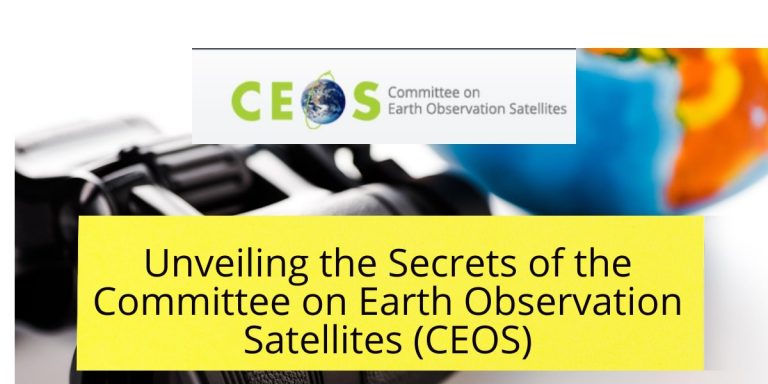Unveiling the Secrets of the Committee on Earth Observation Satellites (CEOS)
Introduction
In the vast expanse of space, where remote sensing technologies have become indispensable tools, one organization stands out for its pivotal role in earth observation: the Committee on Earth Observation Satellites, commonly referred to as CEOS. Established to foster international cooperation in the realm of satellite-based observation, CEOS plays a crucial role in advancing our understanding of our planet and its complex systems.
Understanding CEOS
At its core, CEOS is an international body comprising various national space agencies, research institutions, and governmental organizations. Its primary objective is to coordinate efforts in earth observation by ensuring compatibility and interoperability among satellite systems operated by its member entities.
The Legal Framework
CEOS operates within a legal framework that governs its activities and ensures adherence to established principles. One such legal aspect is its relationship with the European Space Agency (ESA) and other space organizations worldwide. The ESA, being one of the prominent members of CEOS, collaborates closely with the committee on various earth observation projects.
International Collaboration
An essential aspect of CEOS’s mandate is fostering international collaboration. Through partnerships with organizations like the United States Geological Survey (USGS) and the European Space Agency (ESA), CEOS ensures that remote sensing data is shared and utilized for the common benefit of humanity.
The Role of CEOS in Earth Observation
CEOS plays a multifaceted role in advancing earth observation capabilities and applications. From facilitating data distribution to promoting the development of satellite constellations, the committee’s contributions are manifold.
Data Accessibility
One of CEOS’s primary goals is to ensure access to remote sensing data for researchers, policymakers, and other stakeholders. By establishing protocols for data distribution and encouraging open data policies, CEOS promotes transparency and collaboration in the scientific community.
Advancing Technology
CEOS is actively involved in promoting the development of satellite systems and remote sensing technologies. Through collaborative projects and initiatives, such as the Advanced Research and Development (ARD) program, CEOS supports innovation in earth observation and promotes the use of cutting-edge technologies for environmental monitoring.
Policy and Advocacy
In addition to its technical contributions, CEOS also plays a crucial role in shaping policy related to earth observation. By advocating for the use of satellite data in climate policy and resource management, CEOS helps ensure that remote sensing technologies are leveraged effectively to address pressing global challenges.
Challenges and Opportunities
Despite its achievements, CEOS faces various challenges in fulfilling its mandate. These include technological limitations, funding constraints, and geopolitical tensions that may impact international collaboration. However, with these challenges also come opportunities for growth and innovation.
Technological Innovation
Rapid advancements in satellite technology present opportunities for CEOS to enhance earth observation capabilities. From the emergence of small satellites to the development of high-resolution imaging systems, CEOS must stay at the forefront of technological innovation to address evolving earth observation needs.
Global Cooperation
In an increasingly interconnected world, the need for international cooperation in earth observation has never been greater. CEOS has a unique opportunity to foster collaboration among nations and organizations to address global challenges such as climate change, natural disasters, and sustainable development.
Bridging the Digital Divide
CEOS also has a role to play in bridging the digital divide by ensuring that remote sensing data is accessible to all countries, regardless of their technological capabilities. Through capacity-building initiatives and technology transfer programs, CEOS can empower developing nations to leverage satellite data for socioeconomic development.
Quotes
“CEOS’s commitment to international collaboration in earth observation is essential for addressing global challenges and promoting sustainable development.“
“The coordination efforts of CEOS are crucial for ensuring the compatibility and interoperability of satellite systems, enabling seamless data exchange and integration.”
Conclusion
In conclusion, the Committee on Earth Observation Satellites (CEOS) plays a pivotal role in advancing earth observation capabilities and fostering international collaboration in the realm of remote sensing. By promoting data accessibility, advancing technology, and shaping policy, CEOS contributes to our understanding of the planet and its dynamics. As we navigate the challenges of the 21st century, CEOS remains at the forefront of efforts to harness the power of satellite data for the benefit of humanity.

